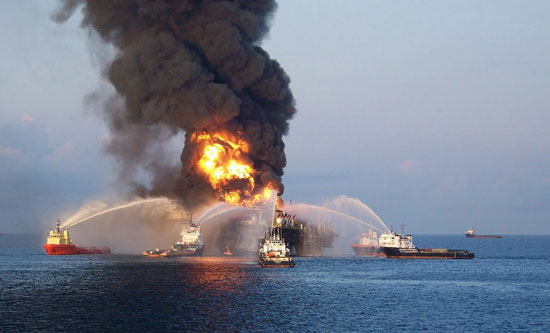
Following two separate oil pipeline leaks in 2008 and 2009 which damaged farmland and fisheries in the Niger Delta region, Royal Dutch Shell has made an out-of-court settlement to avoid an embarrassing High Court case in London. The Bodo community of Nigeria agreed unanimously to Shell’s offer of £55m, split into £35m for affected individuals and £20m for the community. They had previously rejected an offer of £30m made in 2014. The £55m payout is believed to be the largest compensation payment ever made to an African community following environmental damage. This is a victory for the community but the sum pales into insignificance when compared to Shell’s latest published profits – for the third quarter of 2014 they were $5.3 billion (on a current cost of supplies basis). If this case had gone to court in May it would have been the first case to be heard in Britain against the Anglo-Dutch oil giant.
At the time of writing, British Petroleum (BP) is fighting its first case as a defendant in a British court. BP is being sued for £18m by Colombian subsistence farmers who have been victim to environmentally detrimental effects on their land since the laying of the Ocensa pipeline in 1996, which carries 650,000 barrels of crude oil daily from central Colombia to its Caribbean coastline. The farmers have suffered due to water blockages, creating marshland and depriving them of adequate water for their animals. Velez Montoya, from Segovia in north-eastern Colombia, told Judge Stuart-Smith in the London Technology and Construction Court: ‘Our water supply has been damaged by sedimentation since the pipeline was laid and I have lost cattle…I can no longer keep pigs or chickens because there is not enough water for them.’
However, this court case is not BP’s biggest concern. On 20 January the final stage of legal proceedings against BP began in a federal court in New Orleans, in the case against BP for the Deepwater Horizon oil spill in 2010. This was arguably the worst environmental disaster in US history, and BP have already admitted criminal misconduct. The US government is pressing for the maximum fine of $13.8 billion allowed by the judge. This will be the largest ever penalty sought under the Clean Water Act – more than 10 times the previous record. The US government had originally pushed for $4 billion more. The consequences for BP could be huge. The US government is not driven by a will to protect the environment at the expense of profit – this legal challenge is driven partly by inter-imperialist rivalry at a time when the US fracking industry is strong.
Environment Agency – living off environmental destruction
These record court cases create the illusion of a capitalism determined to defend the environment from degradation. However, these cases are tiny compared to the scale of the imperialists’ dependence on environmental destruction. The core of the problem lies in the fact that the ruling class’s riches are thoroughly interwoven with the world’s most damaging industries. A freedom of information request submitted by The Independent (27 December 2014) revealed the Environment Agency’s (EA) £2.3 billion pension fund has investments in a multitude of environmentally harmful industries including fracking, offshore oil, incineration, nuclear energy, chemical companies and mining including diamond mining. The EA is the governmental body responsible for regulating the aforementioned industries operating in Britain – meaning these investments create a clear conflict of interest. However, as the EA does not have direct investments in operations in Britain it is not against the law.
Lord Chris Smith, the former head of the EA, has been supportive of the fracking industry. Now it has emerged that the EA pension fund has investments in Riverstone Energy which holds a 44% stake in Cuadrilla, Britain’s leading fracking firm and also in Centrica (which operates in England and Wales as British Gas), which itself has a £60m investment in Cuadrilla. The Independent reported that minutes of one telephone meeting between Lord Browne (currently CEO of Cuadrilla – formerly CEO of BP) and Lord Smith and other government ministers reveal that the EA offered to ‘shorten the consultation process prior to determining permits’. This offer was declined by Cuadrilla as they were worried it would lead to legal action against them. After a six-month consultation, on 16 January the EA gave Cuadrilla the green light to begin fracking at Preston New Road near Blackpool for the first time since tremors were found to have been caused by previous exploratory drilling.
At the time of writing an approval decision is yet to be made by Lancashire County Council before fracking can begin. Mike Hill, a local independent oil and gas engineer, told stopfyldefracking.org.uk, ‘Public consultation was severely hampered by the fact that the EA will not reveal who is going to treat the flowback [waste water], how are they going to treat it, where it is to happen and where the waste is then to be disposed of. Those details, essential to a real consultation process, were missing and when asked Steve Molyneaux (EA’s Environment Manager for Lancashire) told me that he would not give me that information as it could affect the commercial interests of private companies!’
The EA’s interests are clearly those of capital, not of environmental protection. As crisis deepens, capitalism continues to openly display its inability to take meaningful steps to address the global environmental crisis. Only through socialism can genuine steps be taken to end environmental degradation.
Cal Shaw
Fight Racism! Fight Imperialism! 243 February/March 2015




